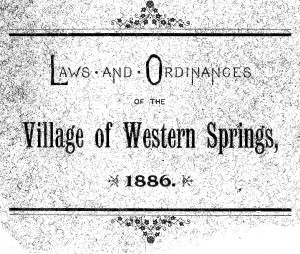When the village was first organized, the founding fathers published a 62-page booklet that described what residents could and could not do. Here are some excerpts.

Cover page from 1886 Village Ordinances
No cows, horses, mules, swine, sheep, goats, geese or cattle of any kind shall be permitted to run at large within the village.
A tax or license fee of two dollars on each dog (three dollars for female dogs) is hereby declared payable each year.
Any person found to have consumed liquor in a bar or saloon will be fined, upon conviction, not less than five dollars, nor more than two hundred dollars for each offense.
No person except police officers shall wear or carry under their clothes, or concealed about their person, any pistol, revolver, sling-shot, knuckles, bowie knife, dagger, or any other dangerous or deadly weapon. However, the Village President may make exceptions where necessary for the safety of the individual.
No person shall leave any animals in any part of the streets, avenues or alleys without securely fastening such animals.
Any citizen may kill any dog found trespassing upon his property, whether the village license has been paid or not.
Any person who shall kill, wound, or attempt to kill any bird with an arrow or stone shall be fined the sum of five dollars.
Any person who shall keep or patronize any bawdy or disorderly house shall be fined not less than twenty-five dollars.
It is declared a nuisance to erect or maintain any privy (outhouse) as near as forty feet to any street, dwelling, shop, or well.
When a person driving a wagon, cart, or horse encounters another such vehicle coming from the opposite direction, each driver shall steer their vehicle to the right side of the road.
No person shall kill or slaughter any cattle without first obtaining a license to do so.
No person shall drive any horse, wagon, cart or other vehicle across a sidewalk unless it be in crossings that lead into a yard or lot.
Every able-bodied male between 21 and 50 years of age is required to labor on the streets of the village for two days each year or, alternatively, may choose to pay the sum of one dollar for each of the two days to the village treasurer.
